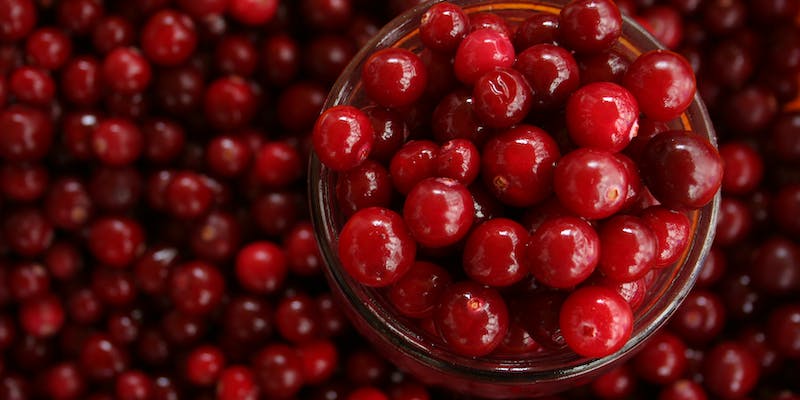Instead of eating them fresh, most people find cranberries—tart, deep-red berries—dried or in juice. The berry harvest usually takes place between September and November. The vine-like development of these berries makes them seem like strawberries.
Interestingly, cranberries have been suggested in recent research as a possible assistance for improving cognitive abilities and memory. According to research published in the Frontiers in Nutrition journal, memory for everyday events, especially visual episodic memory, was significantly enhanced in individuals (aged 50 to 80) who regularly consumed cranberries for 12 weeks. These berry foods are also associated with more blood flow to the brain, brain perfusion, and improved neural function.
The benefits of cranberry juice have a function in cardiovascular health in addition to these cognitive advantages. The bad kind of cholesterol that may cause atherosclerosis (plaque buildup on arterial walls) and artery thickening was much lower in the research.
Cranberries may promote vascular health, which helps brain perfusion and cognitive performance, according to the study team from the UK's University of East Anglia. They go so far as to say that these findings might have a significant impact on the fight against neurodegenerative diseases like dementia.
With no known treatment and an estimated 152 million people living with dementia by 2050, it's crucial to find modifiable lifestyle variables, such as food choices, that may help alleviate the disease. Certain variables can reduce the likelihood of certain illnesses and their overall effect.
Health Benefits of Eating Cranberries

Antioxidants
Cranberries' abundance of plant-based chemicals gives them antioxidant talents and other fitness blessings. The pores and skin of the berry are a great supply of antioxidants, which prevent cellular harm by putting off probably dangerous free radicals. Juicing cranberries gets rid of the peel and its useful elements. Hence, eating entire berries is better for your antioxidant intake than ingesting the juice alone.
UTI Prevention
Cranberries are also proven to reduce UTI risk. Cranberries' proanthocyanidins provide this benefit. They prevent Escherichia coli infections from adhering to the bladder and urine systems.
Improved Heart Health
Moreover, cranberry beans help keep hearts healthy. Their twin action of regulating cholesterol and blood strain is nicely documented. Also, cranberries assist in decreasing blood homocysteine tiers, which are dangerous to the cardiovascular system because they damage the inner lining of blood vessels when found in excessive concentrations.
Prevent Stomach Issues
Additionally, cranberries are top for your stomach issues. They reduce the incidence of Helicobacter pylori-related gastric ulcers and stomach cancer. Cranberries prevent stomach lining bacteria growth, lowering infection and irritation.
Cancer Prevention
Cranberries may additionally have a preventive function against prostate cancer and other cancers. Their excessive attention to ursolic acid, a chemical capable of anti-cancer consequences, makes them an excellent food choice. Even though extra research is required to affirm this, the exciting opportunity that cranberries could help save you from cancer is a robust argument in favor of including them in a healthy weight loss program.
Consuming Cranberries
Cranberry beans may sharpen your intellect and provide a tart taste if eaten daily. Recent research revealed this berry's cognitive health benefits. Participants who consumed cranberries regularly showed notable improvements in visual episodic memory, the kind of memory that involves recalling everyday events. In addition to this memory boost, the study observed enhanced neural functioning and increased blood flow to the brain, a process known as brain perfusion.
This groundbreaking discovery suggests natural dementia prevention methods. The results are relevant given that dementia has no treatment and might impact 152 million people by 2050. They emphasize the role of food in reducing cognitive decline risk and progression. Research has linked a diet high in flavonoids, a category of plant chemicals, to slower cognitive deterioration. Berry foods strong in anthocyanins and proanthocyanidins, the pigments that give them their brilliant red, blue, or purple colors, boost cognition.
Cranberries, rich in micronutrients, benefit more than your brain. The study revealed that cranberries lower LDL cholesterol and are antioxidants and anti-inflammatory. Bad cholesterol causes plaque accumulation in arteries, causing atherosclerosis. Cranberries may improve brain health by improving cognitive function and vascular health.
The revelation that a 12-week intervention involving cranberry beans consumption can yield significant improvements in memory and neural functioning is promising. It paves the way for more extensive research and offers a glimmer of hope in the quest to understand and possibly mitigate the impact of cognitive disorders like dementia.
Early Signs of Potential Dementia

As per the guidelines provided by the NHS, early signs of dementia may include the following ones:
Memory Loss
When you start to forget things more often than normal, it's called memory loss. People sometimes lose their keys and may fail to remember crucial dates or events or ask for the same information more than once.
Difficulty in Focusing
You may discover that it becomes more challenging to maintain attention on activities that you were previously able to do with ease. For example, you may find that you are more disorganized and unable to plan as well as before.
Problems with Routine Activities
This refers to the experience of having trouble understanding or carrying out routine tasks. Something that used to be easy, like keeping track of your change when shopping, might now become a source of confusion.
Difficulty Communicating
You may have difficulty following or participating in discussions. There may be moments when you have trouble forming coherent thoughts or when you mistakenly refer to something.
Temporal and Locational Disorientation
It may be difficult to keep track of the passing of time, the seasons, or even specific dates. There will be moments when you completely lose track of time and space.
Mood Swings
You may have irrational mood or behavior changes. You may lose your temper with colleagues, coworkers, or family due to overwhelming grief, fear, or excitement. You should see a healthcare provider if you or a loved one are encountering these symptoms. Their advice and encouragement may be invaluable.







